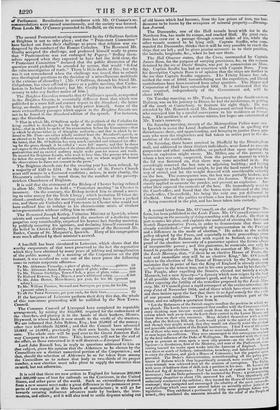A handbill has been circulated in Leicester, which shows that
the worthy corporators of that town preserved to the last the reputation which they have obtained by many years of jobbing and misapplication of the public money. At a meeting of the Corporation on the 22d instant, it was resolved to vote out of the town purse the following sums to certain corporate officers— To Mr. Alderman Firmadge, a piece of plate, value guineas 50 To Mr. Alderman James Rawson, a piece of plate, value 100 To Mr. Thomas flurbidge, Town-Clerk, a piece of plate, value 300 To Richard Rawson, Esq.,1Iayor, a year's additional salary £400 To Mr. John Hester, Mace-bearer, per year, for his life (present
salary) 100 To Mr. William Parsons, Steward and Surveyor, per year, for his life, (present salary) 100
To all the Town Servants, per year each, for their lives 25
If the burgesses of Leicester perform their duty this day, the whole of this monstrous proceeding will be nullified by the New Town- Council.
The Common Council of Liverpool have completed its reputable arrangement, by raising the 10.5,000/. required for the endowment of the churches, and placing it in the hands of their bankers, Messrs. Heywood, in whose books it now stands to the credit of the trustees. We are informed that John Bolton, Esq., lent 20,0001. of the money ; other two individuals 32,000/. ; and that the Council have advanced 53,0001. or 54,0001., previously in their own hands, to complete the sum. The whole sum will be paid over to the Grand Junction Rail- way Company in a short time. This, however, will not be the end of the affair, as those concerned in it will discover.—Liverpool Times.
Lord John Russell has, in reply to questions addressed to him on that subject, given his opinion that the Aldermen to be chosen by the Councillors are a distinct numerical portion of the Corporation ; and that, should the selection of Aldermen be so far taken from among the Councillors as to reduce that body to two-thirds of its proper number, a new election must take place to supply the vacancies thus created, but not otherwise.


























 Previous page
Previous page